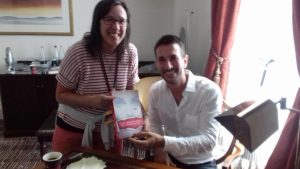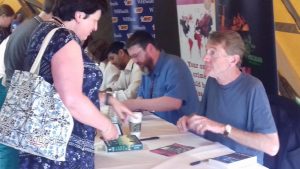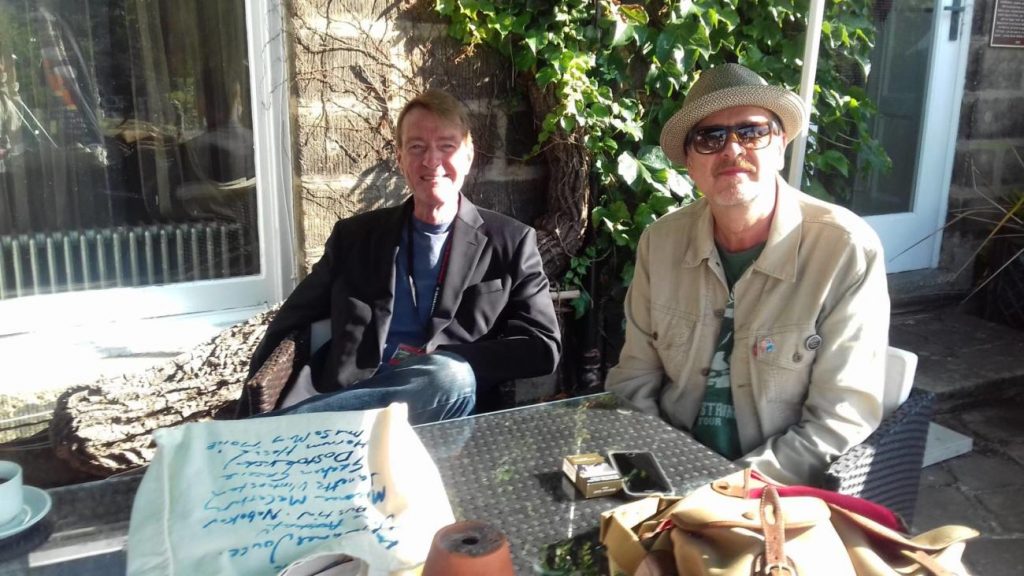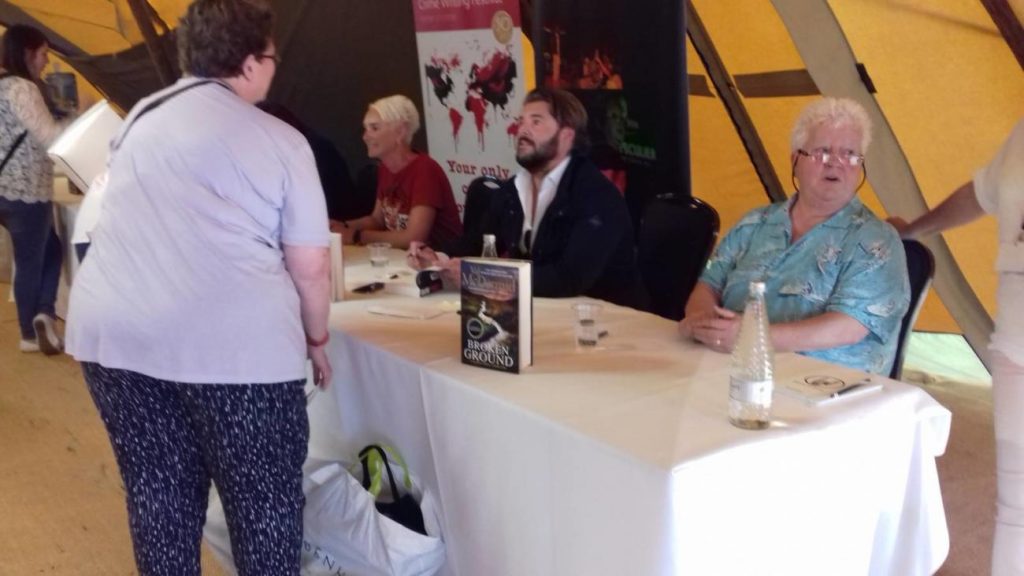JLife was delighted when Abi Silver, author of The Pinocchio Brief and The Aladdin Trial, visited Harrogate to investigate this year’s Theakston Old Peculier Crime Writing Festival for a special blog report from the event…
With panels entitled ‘New Blood’ and ‘That’s where the heart is’, visitors might have been forgiven for assuming they had wandered into a pathologists’ convention, rather than a writers’ festival. But this was the highly acclaimed (and deservedly so) Theakston Old Peculier Crime Writing Festival, which took place at the Old Swan hotel in Harrogate from 19th to 22nd July. Here is what can only be a taste of this truly action-packed event, with my awards for ‘best of’, aptly named ‘The Silvers’, at the end.
‘Creative Thursday’ consisted of crime-fiction-writing workshops and the opening party, at which Stav Sherez took the top award, his novel, The Intrusions, having been referred to by Ian Rankin as “a Silence of the Lambs for the internet age.” John Grisham, at the festival for the first time, was also honoured with the Outstanding Contribution to Crime Fiction Award, telling the audience that Theakston Old Peculier is his “favourite beer in the world”. Various best-selling crime writers, in suitably relaxed mode, also performed their favourite songs.
Friday was when the serious talking began and what an inspiring start it was. Dame Denise Mina, whose most recent novel The Long Drop was branded “a masterpiece” by the Daily Telegraph, spoke about her early life and influences. Although she was brought up in a traditional, religious environment, her mother had insisted on following her oil-industry working father around the world, including to Holland, where the seven members of the family all lived in a tiny caravan. Eternally optimistic, she observed that one advantage of the close quarters was that you could ‘lie in bed and cook dinner at the same time.’
Her novels are imbued with her “fierce sense of social justice” and she believes that fiction is better than non-fiction at getting her message across, as well as providing a valuable snap shot for social historians on the period in which it takes place. The Long Drop is set in Glasgow in 1957, a period when, Mina reflects, “Glasgow was really wild”.

On early inspiration, Fiona Cummins (author of Rattle and The Collector), who used to work at The Daily Mail, recounted how her journalistic background had influenced her writing process. She always tests out elements of her plot, so once left a note in saltwater on her window ledge for two weeks to check if it remained legible. Candice Fox (Hades) was one of six natural children, but her parents also fostered more than 150 other children. She spent her formative years listening to her mother talking to the police about some of those children and her father, a parole officer, recounting stories of his daily life at the nearby prison.
On setting, AA Dhand (Streets of Darkness) channels all his childhood experiences of Bradford (which he sees as “a wonderful canvas”) into his novels. He grew up behind the counter of a convenience store and his family was the first Asians to live on the Holme Wood housing estate. He loves to use location to put his characters (and through them, his readers) on edge. Leye Ademie (Easy Motion Tourist) has Lagos, the “mega city of extremes”, as the backdrop for his books, his central character viewing events, sometimes macabre, through the eyes of a white outsider.
On mentors, Linwood Barclay (A Noise Downstairs) reminisced about Ross Macdonald (author of the Lew Archer series), with whom he had corresponded for many years. Linwood’s reason for writing is “to bring sunlight to what has been buried”. He also explained that the twists he writes in his books work best “if they surprise him too” and that, when writing, he tries to think of the logical end to any chapter…and then write something completely different.

The highlight of Friday (for most) was the evening interview of the giant of the genre’, John Grisham, at the sumptuous Royal Hall, by his close friend Lee Child (the Jack Reacher series). (Incidentally, Lee was a wonderfully accessible programming chair for the festival, gracious and welcoming to all, as well as having orchestrated a very fine line up of authors.)
John told avid listeners that summer construction jobs laying asphalt in Mississippi had made him determined to advance academically, choosing law school “to get a leg up”. In around 1985, while standing in a courtroom, he had suddenly decided he wanted to write a story, but he had no idea how to craft one, the first draft of A Time to Kill took three years to write, by hand, and was 1,000 words long! Fortunately, critical acclaim came swiftly and dramatically with his second novel, The Firm (he confessed this had been a working title which stuck), when the film rights were sold even before the book. And that he believes his broad spectrum of readers is down to his intention to write “for your 80-year old mother or your 15-year old daughter”.
John explained how shortcomings in the US legal system bother him immensely and his goal has become to weave this frustration into his stories.
In terms of writing process, Lee Child (himself author of 22 Jack Reacher novels, the 23rd – Past Tense is out shortly) explained that he writes in his New York apartment in the afternoons or evenings, beginning on 1st September each year and he advised that “nothing of value is ever achieved in the morning”. Hilariously, Grisham replied that he only writes between 7 and 11am. He begins a new book on 1st January each year and aims to have it finished by 1st July. And in another example of how there is really no ‘right’ way to write, Grisham confesses he always knows the beginning and end of his stories at the start and then fills up the middle. Child says that he never knows the end of a novel when he starts – “If I did, I’d be bored”.

Saturday began with double act Nicci French (Day of the Dead), the remarkable husband and wife writing team of Nicci Gerrard and Sean French. They met in 1990 and their literary collaboration (20 bestsellers, nine million books sold) began as rather an experiment into whether “two people could make a voice together”. They write about things which make them feel alarmed and bothered and have only once written while physically together (it was a disaster and not to be repeated). Instead, Nicci works in the attic and Sean in the shed (!) and they email parts of the story to each other for editing. One of their rules is that they never reveal which of them wrote which sections of their books. Nicci says she and Sean “tame the world together” through their writing. In particular, she feels that thriller writing is like ‘giving shape to chaos’.
On historical fiction, Antonia Hodgson (Death at Fountains Abbey) has always been interested in periods of history that are neglected (her novels are set in the early Georgian period) and, despite covering dark events, they are imbued with a real sense of fun. She reviewed old trial transcripts and The Beggars’ Opera to help with her dialogue. Simon Mayo (Mad Blood Stirring) came across the real life story of ‘King Dick’, a 6 foot 7 inch black US prisoner of war, incarcerated in Dartmoor prison in 1815, in the aftermath of the US ‘Second War of Independence’ by chance. When he read that the segregated black prisoners had put on productions of Othello and Romeo and Juliet, his interest was piqued.
On unusual story structure, Stuart Turton (The Seven Deaths of Evelyn Hardcastle – described as Quantum Leap meets Agatha Christie) explained that he had always loved Agatha Christie. His debut novel, set in a 1920s country house, involves a groundhog day plot where the investigator inhabits the body of a different suspect each day. If he does not succeed in finding the murderer by nightfall, then the victim dies and the next day he is catapulted into a different body!
On setting (again) Will Dean (Dark Pines) was inspired by the remote Swedish town where he lives and begins his novel on the first day of the elk hunt. He chose to make his heroine, Tuva Moodyson, deaf, both to heighten the tension and because deaf people are so unrepresented in the genre.
On impostor syndrome, Abir Mukherjee (Smoke & Ashes) claims his inner critic is frequently “slapping him across the face”, that he writes as therapy and that, for him, writing is also a search for identity. Eva Dolan (This Is How It Ends) writes from a position of anger, beginning with something she feels furious about and, rather than build a crossbow (!) she produces a story.

The early evening saw a remarkable exchange between Val McDermid (Insidious Intent) and Dame Professor Sue Black, forensic anthropologist, anatomist and academic. The two have been friends for years and Sue is Val’s “go to” person for all things forensic. Sue explained that her journey into her chosen profession developed incrementally from gutting small animals her father hunted and brought home, to a job in the local butcher to an interest in anatomy, ending up in the mortuary!
She has been instrumental in many research campaigns including into the vein patterns on the back of your hand; apparently no two hands are the same. Incredibly, her research has led to numerous convictions of sex offenders via their hands, which are often visible in the videos they produce. She has recently written a book called ‘All That Remains: A Life in Death’ a memoir which reveals the many faces of death she has encountered in her remarkable life both personal and professional.
The murder-mystery author dinner followed (fortunately with a sufficient break to re-focus away from forensics) with writers enacting a short mystery, penned by our chair, for diners to solve. This year’s scenario involved the murder of Troy Granite, actor, found with a rolled-up copy of a paperback crime fiction novel lodged in his throat.
This was an incredibly informative, enjoyable and exhausting event for writers and readers alike, a chance to hear from those at the top of their game (and from a few newbies too) on how and why they write and to obtain a sneak preview of what’s coming next. And now for the awards.
The Silvers (my awards for best of…)
Most pragmatic approach to setting: ‘John le Carre lived in Nairobi for three months to write The Constant Gardener but he didn’t have to be at the school gates at 3pm’ – Susie Steiner (Missing, Presumed)
Most valuable advice on what readers think about writers: ‘No one ever thinks you’ve done the murders, but they always think you’ve done the sex’ – Stella Duffy
Most political joke: ‘I would[n’t] do anything for love’ – Charles Cumming (The Man Between) deliberately mis-quoting Meatloaf (as in Bat out of Hell) with reference to the recent Trump/Putin ‘would/wouldn’t’ debacle
Best metaphor: ‘Crime fiction is not a formula; it’s a Swiss watch’- Linwood Barclay in conversation with Laura Lippman (Wilde Lake)
Most interesting fact: ‘Bradford was the richest city in Europe 200 years ago’ – AA Dhand
Most negative book review: ‘I hated your book so much I wish I could unread it’ – reader to Lee Child
Most bizarre question (possibly ever): ‘I heard on Radio Four that public conveniences for women are a recent addition to our lives. Did this impact your stories?’ – to historical fiction panel
Best rhetorical question (ever?): ‘How can you place more value on a cup of coffee…than on something which can change your life?’ – Lee Child and Abir Mukerjee

